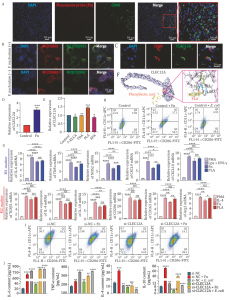Request Demo
Last update 20 Oct 2025
CD206
Last update 20 Oct 2025
Basic Info
Synonyms bA541I19.1, C-type lectin domain family 13 member D, C-type lectin domain family 13 member D-like + [13] |
Introduction Mediates the endocytosis of glycoproteins by macrophages. Binds both sulfated and non-sulfated polysaccharide chains.
(Microbial infection) Acts as a phagocytic receptor for bacteria, fungi and other pathogens.
(Microbial infection) Acts as a receptor for Dengue virus envelope protein E.
(Microbial infection) Interacts with Hepatitis B virus envelope protein. |
Related
15
Drugs associated with CD206Target |
Mechanism CD206 inhibitors |
Active Org. |
Originator Org. |
Active Indication |
Inactive Indication |
Drug Highest PhaseApproved |
First Approval Ctry. / Loc. United States |
First Approval Date13 Mar 2013 |
Target |
Mechanism CD206 inhibitors [+1] |
Active Org. |
Originator Org. |
Active Indication |
Inactive Indication- |
Drug Highest PhasePhase 3 |
First Approval Ctry. / Loc.- |
First Approval Date- |
Target |
Mechanism CD206 inhibitors |
Active Org. |
Originator Org. |
Active Indication |
Inactive Indication- |
Drug Highest PhasePhase 2 |
First Approval Ctry. / Loc.- |
First Approval Date- |
44
Clinical Trials associated with CD206NCT07159074
Repurposing Tc 99m Tilmanocept Imaging for Cardiac Sarcoidosis
The purpose of this study is to see if Tc 99m Tilmanocept SPECT/CT imaging can be used to identify cardiac sarcoidosis.
Start Date01 Sep 2025 |
Sponsor / Collaborator  Duke University Duke University [+1] |
NCT05933239
A Phase II Study to Evaluate the Imaging Potential of 68GaNOTA-Anti-MMR VHH2 for in Vivo Imaging of MMR-expressing Macrophages by Means of Positron Emission Tomography (PET) in Patients With Non-small Cell Lung Cancer (NSCLC)
Phase II study to evaluate the clinical potential of 68GaNOTA-anti-MMR-VHH2 for in vivo imaging of Macrophage Mannose Receptor (MMR)-expressing Macrophages by means of Positron Emission Tomography (PET) in patients with non-small cell lung cancer (NSCLC) planned for surgical resection.
Start Date30 Mar 2023 |
Sponsor / Collaborator |
NCT05446324
SENtinel Lymph Node Mapping With GAllium-68-tilmanocept PET/CT in High/High-intermediate Risk Endometrial Cancer: a Pilot Study
This pilot study evaluates the feasibility of 68Ga-tilmanocept PET/CT for SLN mapping in patients with endometrial cancer.
Start Date15 Feb 2023 |
Sponsor / Collaborator |
100 Clinical Results associated with CD206
Login to view more data
100 Translational Medicine associated with CD206
Login to view more data
0 Patents (Medical) associated with CD206
Login to view more data
9,063
Literatures (Medical) associated with CD20601 Mar 2026·BIOMATERIALS
Chemotaxis-guided nanoplatform for non-alcoholic steatohepatitis therapy via macrophage reprogramming, hepatoprotection and gut microbiome modulation
Article
Author: Wang, Yanwen ; Zhao, Xinlin ; Pan, Xier ; Tang, Yun ; Zou, Jiafeng ; Chen, Xinyi ; Gao, Feng ; Ma, Ying ; Lin, Yiting
Non-alcoholic steatohepatitis (NASH), characterized by hepatic steatosis, inflammation, and varying degrees of fibrosis, has become a growing global health burden. Obeticholic acid (OCA, a farnesoid X receptor agonist) has shown limited efficacy due to poor solubility, single-target mechanisms, and off-target side effects, notwithstanding the great promise of this agent in NASH clinical trials. Here, we designed M2 macrophage-derived membrane (M2M)-camouflaged poly (lactic-co-glycolic acid) (PLGA) nanoparticles (O@PLGA@M) to achieve targeted OCA delivery to the inflamed liver niche for recovering hepatic homeostasis in NASH. The M2M improved the inflamed liver-targeting of the nanoplatforms via chemotaxis and promoted M1-to-M2 macrophage repolarization, as evidenced by a 2.5-fold increase in CD206 expression and 45 % reduction in CD86 expression in the liver. In a methionine/choline-deficient (MCD) diet-induced murine NASH model, O@PLGA@M exhibited excellent biosafety and multifaceted anti-NASH efficacy, including anti-steatosis, anti-inflammatory, and anti-fibrotic effects. Mechanistically, O@PLGA@M reprogrammed macrophages by modulating macrophage polarization and inhibiting recruitment of immune cells to reduce the inflammatory cascade. They also exerted hepatoprotection effects by reducing steatosis and hepatocyte damage. Moreover, O@PLGA@M modulated the gut microbiome by redirecting it towards a beneficial state, which further relieved NASH through the gut-liver axis. These findings demonstrated that the biomimetic nanoplatforms could be employed as promising strategies that integrated targeted delivery and multimodal synergistic therapy for NASH management.
01 Mar 2026·BIOMATERIALS
ROS-responsive resiquimod prodrug nanoparticles for macrophage reprogramming and enhanced immune checkpoint inhibitor therapy in bladder cancer
Article
Author: Chen, Zhiqiang ; Liu, Yijing ; Geng, Rui ; Shang, Haojie ; Zhu, Jintao ; Tang, Kun
Bladder cancer remains a formidable challenge, especially for patients who fail to respond adequately to immune checkpoint inhibitors (ICIs). The suboptimal efficacy of current treatments underscores an urgent need for more effective immunomodulatory strategies. Here, we propose a ROS-responsive resiquimod (R848) prodrug (R-P) that improves drug delivery and reshapes the immunosuppressive tumor microenvironment. Clinical data from The Cancer Genome Atlas and patient samples underscore the therapeutic value of targeting CD206 and TLR7/8 to repolarize tumor-associated macrophages. The prodrug R-P is created by conjugating a phenylboronic acid pinacol ester moiety to R848 via a succinic anhydride linker, enabling the prodrug to remain stable in systemic circulation while releasing its parent compound in the oxidative tumor microenvironment, thereby minimizing off-target effects. Further, mannose-functionalized nanoparticles (R-P@APM-DPs) achieve an impressive loading capacity of R848 (34.3 %) and exhibit robust ROS-responsive release. In a murine MB49 bladder cancer model, R-P@APM-DPs significantly reduce tumor growth, enhance M1 macrophages, and increase CD8+ and CD4+ T cells, while decreasing the number of immunosuppressive cells. Notably, combination therapy with anti-PD-1 leads to a potent anticancer response in both MB49-bearing mice and patient-derived organoids. This synergy highlights the translational potential of a ROS-responsive prodrug approach for enhancing ICI-based immunotherapies.
01 Feb 2026·BIOMATERIALS
Temporary silk nanocoatings preserve immune cell functions and protection against biochemical and mechanical stressors
Article
Author: Majumder, Nilotpal ; Staii, Cristian ; Sutaria, Julian M ; Kumarasinghe, Udathari ; Kaplan, David L ; Luo, Ying ; Chen, Ying
Cell-based therapies offer transformative potential for treating a range of diseases, however, maintaining desirable cell functions under environmental and biochemical stresses remains a major challenge. In the present study, silk ionomer nanoencapsulation using layer-by-layer (LbL) deposition was utilized as a versatile strategy to provide temporary cell protection from these stresses and preserve cell functions for downstream use. Using THP-1 immune cells, tunable encapsulation of the cells with up to 10 bilayers of silk was demonstrated. Characterization by quartz crystal microbalance (QCM-D) and atomic force microscopy (AFM) revealed nonlinear thickness growth (∼800 nm) and peak stiffness of 231 kPa above five bilayers, indicating a transition from rigid initial layer deposition, to softer outer layers. We demonstrate that the silk ionomer coatings preserved cellular functions, including differentiation into M1 and M2 macrophages, the associated cytokine profiles (TNF-α, IL-1β, IL-10, TGF-β), and expression of cell surface markers (CD68, CD206) when compared to the uncoated controls. Notably, these temporary coatings blocked antibody binding to CD14/CD68 receptors and also protected cells from shear stress during extrusion through a 34G needle at 200 μL/min, resulting in greater than a 70 % increase in cell survival compared to the uncoated cells during extrusion. These results establish silk ionomers as a robust biomaterials platform for enhancing the mechanical resilience and immune evasion of cells in advanced applications, such as for 3D bioprinting, adoptive immunotherapy, and regenerative transplantation.
26
News (Medical) associated with CD20619 Jul 2025
GA, UNITED STATES, July 19, 2025 /
EINPresswire.com
/ -- A growing body of research is revealing the hidden influence of microbes on cancer. Recently, researchers have identified
Fusobacterium nucleatum
as a key player in shaping the immune environment in esophageal squamous cell carcinoma (ESCC). By integrating data from microbiome, metabolome, and transcriptome analyses, the study shows that the bacterium and an associated metabolite phenyllactic acid (PLA) promote the expression of CLEC12A, an immune receptor that encourages immune-suppressive macrophages. This dual microbial and molecular mechanism may contribute to treatment resistance in some ESCC patients, offering a potential explanation for the uneven response to immunotherapy and a new target for future interventions.
Esophageal squamous cell carcinoma (ESCC) is a deadly cancer with particularly high prevalence in East Asia. While immunotherapy has emerged as a promising treatment, many patients fail to respond—raising questions about hidden factors influencing therapeutic outcomes. Recent studies have turned attention to the tumor microbiome, which can interact with host immunity in complex ways. Oral pathogens such as F. nucleatum, long associated with periodontal disease, are now being implicated in cancer progression and immune escape. Their metabolites may serve as messengers, subtly rewiring the tumor's immune landscape. Due to these challenges, in-depth research is needed to uncover microbial mechanisms that modulate immune responses in ESCC.
In a letter-style study published on October 29, 2024, in Protein & Cell, a research team from the Fourth Hospital of Hebei Medical University, etc. revealed how Fusobacterium nucleatum manipulates immune behavior in ESCC. Drawing from a cohort of 52 patient samples, the team conducted microbiome sequencing, transcriptome analysis, and metabolomics profiling. Their work uncovered a strong link between microbial colonization, immune receptor expression, and immune cell polarization—offering fresh insight into how bacteria might undercut the body's cancer-fighting abilities.
The researchers divided ESCC patients into treated and untreated groups and profiled their tumors at multiple molecular levels. They found that F. nucleatum was significantly more abundant in untreated tumors and was associated with more advanced cancer stages. Transcriptome analysis revealed that patients with high levels of this bacterium also had increased expression of CLEC12A, a receptor found on immune cells like macrophages. These immune cells, when influenced by F. nucleatum, shifted toward the M2 state—a pro-tumor phenotype characterized by heightened expression of immunosuppressive markers (e.g., CD206, CD163).
Further analysis pointed to phenyllactic acid (PLA), a metabolite associated with the bacterium, as a key driver of this effect. Lab experiments confirmed that both F. nucleatum and PLA upregulated CLEC12A and boosted M2 macrophage markers in cultured immune cells. Silencing CLEC12A reduced the bacterium's effect on M2 polarization and restored pro-inflammatory responses. These findings suggest a microbiota-driven mechanism that helps tumors escape immune surveillance by recruiting "tolerant" immune cells, and they highlight CLEC12A as a potential molecular bridge between microbial signals and immune modulation.
This study shines a light on the microbial dark matter of cancer, said Dr. Jing Zuo, one of the co-corresponding authors of the study. The research team has uncovered how F. nucleatum not only survives in tumor environments but actively changes how immune cells behave. By producing or associating with specific metabolites like PLA, the bacterium effectively reprograms macrophages into a tumor-supportive state. This opens up exciting possibilities for developing precision immunotherapy that takes a patient's microbiome into account.
The findings open new frontiers in the battle against ESCC. With F. nucleatum and PLA shown to influence immune evasion, the study points to microbiome profiling as a potential predictive tool for immunotherapy success. Therapies that disrupt this microbial-immunological axis—such as targeting CLEC12A or modifying gut flora—could offer innovative ways to overcome treatment resistance. Additionally, these insights could extend beyond ESCC, prompting researchers to investigate similar microbial effects in other cancers. As the interplay between microbes and immunity becomes clearer, the future of cancer therapy may hinge on more than just genetics—it may depend on our microbial cohabitants as well.
References
DOI
10.1093/procel/pwae063
Original Source URL
https://doi-org.libproxy1.nus.edu.sg/10.1093/procel/pwae063
Funding information
This work was supported by the Natural Science Foundation of China (Grant No. 82373072) awarded to Z.N., the Key Project of Hebei Province Natural Science Precision Medicine Joint Fund (H2022201067) awarded to Z.N., and the Natural Science Foundation of Hebei Province (Grant No. H2024206159) awarded to J.Z.
Lucy Wang
BioDesign Research
email us here
Legal Disclaimer:
EIN Presswire provides this news content "as is" without warranty of any kind. We do not accept any responsibility or liability
for the accuracy, content, images, videos, licenses, completeness, legality, or reliability of the information contained in this
article. If you have any complaints or copyright issues related to this article, kindly contact the author above.

ImmunotherapyClinical Study
21 May 2025
PALO ALTO, Calif.--(BUSINESS WIRE)--Guardant Health, Inc. (Nasdaq: GH), a leading precision oncology company, today announced the addition of a full suite of immunohistochemistry (IHC) testing to the company’s portfolio of tumor molecular profiling tests. This new set of tests will help oncologists identify tumor subtypes and match cancer patients to the most effective targeted therapies.
IHC testing is a special staining process that detects specific proteins within a tissue sample, known as tumor biomarkers, that can be used to determine the characteristics of a tumor and identify the most appropriate targeted cancer therapy. The new Guardant IHC test suite provides comprehensive testing for key biomarkers in all solid tumors (such as lung, breast, gastric and ovarian cancers). This includes c-MET, the target of Emrelis™ (telisotuzumab vedotin-tllv), an antibody-drug conjugate recently approved by the U.S. Food and Drug Administration (FDA) for the treatment of c-MET-expressing non-squamous non-small cell lung cancer (NSCLC).
“The information about tumor characteristics garnered from advanced IHC testing will complement the multidimensional insights we are currently providing to oncologists through our recently introduced Guardant360 Tissue multiomic tumor profiling test,” said Helmy Eltoukhy, Guardant Health chairman and co-CEO. “This expansion of our portfolio will allow us to offer cancer care teams more comprehensive tissue testing capabilities through a single source to help them make more informed decisions about therapy selection and optimize outcomes for their patients.”
The comprehensive IHC menu covers the following biomarkers: HER2, MMR, PD-L1, c-MET, ER, PR, Ki-67, CLDN18, and FOLR1.
About Guardant Health
Guardant Health is a leading precision oncology company focused on guarding wellness and giving every person more time free from cancer. Founded in 2012, Guardant is transforming patient care and accelerating new cancer therapies by providing critical insights into what drives disease through its advanced blood and tissue tests, real-world data and AI analytics. Guardant tests help improve outcomes across all stages of care, including screening to find cancer early, monitoring for recurrence in early-stage cancer, and treatment selection for patients with advanced cancer. For more information, visit guardanthealth.com and follow the company on LinkedIn, X (Twitter) and Facebook.
Forward-Looking Statements
This press release contains forward-looking statements within the meaning of federal securities laws, including statements regarding the potential utilities, values, benefits and advantages of Guardant Health’s liquid biopsy tests or assays, which involve risks and uncertainties that could cause the actual results to differ materially from the anticipated results and expectations expressed in these forward-looking statements. These statements are based on current expectations, forecasts and assumptions, and actual outcomes and results could differ materially from these statements due to a number of factors. These and additional risks and uncertainties that could affect Guardant Health’s financial and operating results and cause actual results to differ materially from those indicated by the forward-looking statements made in this press release include those discussed under the captions “Risk Factors” and “Management’s Discussion and Analysis of Financial Condition and Results of Operation” and elsewhere in its Annual Report on Form 10-K for the year ended December 31, 2024, and in its other reports filed with or furnished to the Securities and Exchange Commission thereafter. The forward-looking statements in this press release are based on information available to Guardant Health as of the date hereof, and Guardant Health disclaims any obligation to update any forward-looking statements provided to reflect any change in its expectations or any change in events, conditions, or circumstances on which any such statement is based, except as required by law. These forward-looking statements should not be relied upon as representing Guardant Health’s views as of any date subsequent to the date of this press release.
Drug ApprovalImmunotherapy
12 Dec 2024
ROCKVILLE, Md., Dec. 12, 2024 /PRNewswire/ -- The Association of Cancer Care Centers (ACCC) is proud to announce an innovative quality improvement (QI) workshop opportunity designed to help cancer centers integrate biomarker testing into treatment plans for patients with gynecologic cancers.
Why Biomarker Testing Matters
Biomarker testing has proven an essential tool for diagnosis and treatment for gynecologic cancers. Despite its critical importance, barriers such as financial challenges, care coordination gaps, and limited provider awareness prevent many patients from accessing testing.
Customized Workshop Opportunity
This initiative offers cancer centers an opportunity to lead the way in improving access to biomarker testing, ultimately advancing the quality of care for patients with gynecologic cancers. ACCC is inviting cancer centers to participate in a QI initiative aimed at:
Assessing Gaps: Identifying barriers to implementing guideline-concordant testing for biomarkers such as HRD, MMR/MSI, and HER2
Addressing Barriers: Tackling social drivers of health (SDOH) such as financial toxicity, coordination of genetic testing, and provider education
Enhancing Care: Developing actionable strategies and accessing resources to integrate biomarker testing.
Selected sites will also receive a $10,000 stipend to support their participation in this program.
Additionally, participants will gain hands-on access to resources such as ACCC's Quality Self-Assessment Tool for Ovarian Cancer Care Delivery. Inspired by the research of Temkin et al., this resource helps cancer programs:
Conduct baseline assessments of care practices
Identify gaps across 7 key domains, including prevention, care coordination, and survivorship
Implement evidence-based strategies to elevate the quality of gynecologic cancer care.
Get Involved
Centers interested in participating in this workshop and QI initiative are encouraged to contact Bianca Alvarez, MPH, CHES, at
[email protected].
This QI initiative and the assessment tool underscore ACCC's commitment to supporting cancer programs in delivering equitable, patient-centered care that addresses the unique challenges of gynecologic cancer treatment.
About ACCC
The Association of Cancer Care Centers (ACCC) is the leading education and advocacy organization for the cancer care community. With a network of more than 45,000 multidisciplinary professionals, ACCC is dedicated to improving access, quality, and equity in cancer care delivery.
SOURCE Association of Cancer Care Centers (ACCC)
WANT YOUR COMPANY'S NEWS FEATURED ON PRNEWSWIRE.COM?
440k+
Newsrooms &
Influencers
9k+
Digital Media
Outlets
270k+
Journalists
Opted In
GET STARTED
Analysis
Perform a panoramic analysis of this field.
login
or

AI Agents Built for Biopharma Breakthroughs
Accelerate discovery. Empower decisions. Transform outcomes.
Get started for free today!
Accelerate Strategic R&D decision making with Synapse, PatSnap’s AI-powered Connected Innovation Intelligence Platform Built for Life Sciences Professionals.
Start your data trial now!
Synapse data is also accessible to external entities via APIs or data packages. Empower better decisions with the latest in pharmaceutical intelligence.
Bio
Bio Sequences Search & Analysis
Sign up for free
Chemical
Chemical Structures Search & Analysis
Sign up for free



